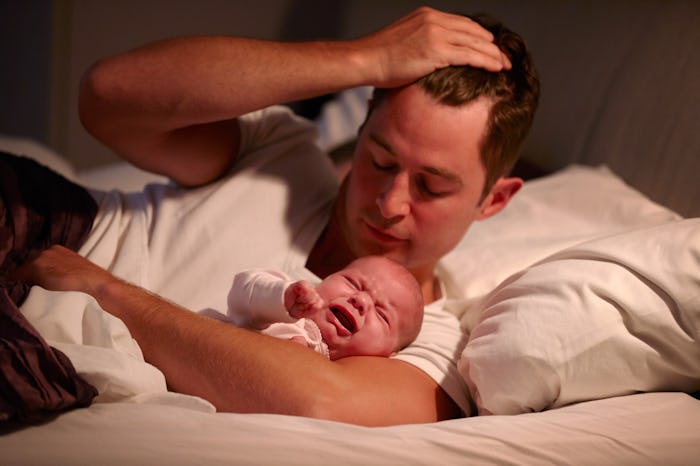There’s nothing worse than handing your baby over to your partner when you need some help — or even just to go to the bathroom — and your baby begins screaming. It makes you feel bad, and most definitely makes your partner feel bad. As your baby is screaming and you and your partner are cringing, you may be wondering, "Why does my baby hate my partner?" But is it even emotionally or psychologically possible at such a young age for a baby to hate someone? How can you fix this issue?
Thankfully, according to experts, it’s not actually hate. Hate is a learned behavior and beyond your child's emotional development when they’re a baby. They mainly feel an array of emotions between happy and sad, Maureen Healy, an expert on sensitive children and author of Growing Happy Kids, tells Romper.
"Hate is a socially learned emotional reaction. But, they can be angry at one of their parents, and the typical reasons for the baby to be angry in this case is because mommy was taken away and the baby wants that partner rather than you," Dr. John Mayer, clinical psychologist adds in an email interview with Romper.
So why do they act like they hate your partner and become angry? Mayer says that a baby’s instinct sets the primary caregiver as their "absolute preference over anyone" and that the baby’s learned behavior "may react to the partner simply as a result of how much time the child has experienced the partner." Since they view mom as the primary caregiver, they seem to communicate they "like" mom best.
Healy agrees, saying "When [babies] aren't being cared for by that primary caregiver, they can become upset, nervous, and anxious. This also makes sense from an emotional standpoint since one of a baby's primary needs is to feel safe, which they tend to rely on one person to fulfill that need early on."
"Babies prefer caregivers who are familiar and those who sensitively and consistently meet their needs, therefore, if your partner isn't very familiar to them or sensitive to their needs, then they probably will react negatively to being with them," Dr. Wyatt Fisher, a clinical psychologist in Denver says to Romper in an email.
According to all the experts, the key to ensuring your baby doesn’t react negatively and cry with your partner is to increase their time spent with the partner so they can become more "familiar" with each other. The baby can become more familiar with the partner and how they do things, and the partner can learn the baby’s cues and needs. Through this, they build a bond.
Mayer suggests some ways for your partner to bond more with the baby, like attending to the baby’s needs like you do — changing diapers, cuddling, playing, comforting, and feeding.
Healy says you can build up your baby and partner's relationship in as little as just five minutes a day. "Little by little, you need to introduce your partner to the regular everyday things that your baby enjoys, whether it is feeding time, tummy time, going in the stroller, or listening to music," she says. "When a baby begins relating this partner (or other person) to something they like, they're more akin to feel more positive toward them and develop a sense of security, as well as possibly affection for them."
So don't fret, your baby doesn't hate anyone. Instinctually, babies have a strong bond with whoever they view as their primary caregiver. Just make sure you and your partner try to spend an equal amount of time with your baby, and split the baby duties equally. Your baby will be just as happy to see your partner and spend time with them as they are with you.
